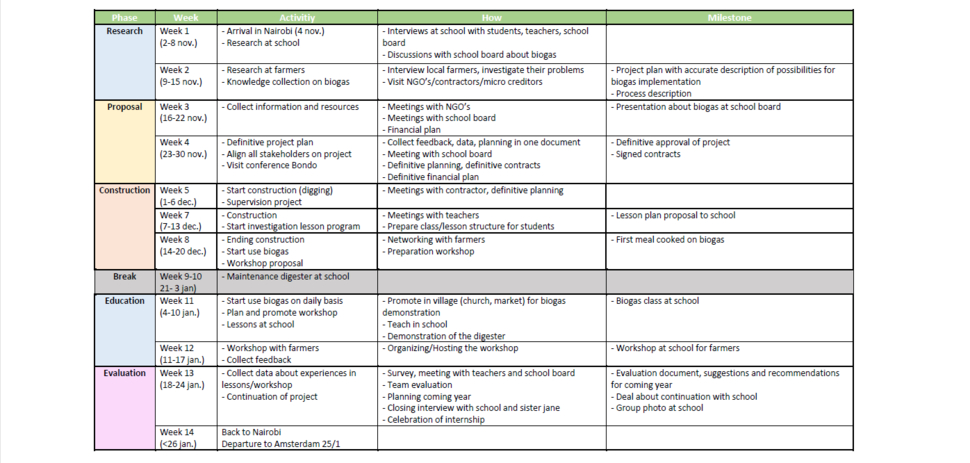- Textual explanation
Phase 1 (week 1-2): Research
The first weeks are all about researching the opportunities at the school for setting up the biogas digester and the network around it. This also means we have to learn about students’ life, daily habits, the way teachers prepare their lessons and if there’s any room in their curriculum for lessons about biogas. This can be helpful looking for the best implementation method later on. Maybe the the technology can be related to other classes like agriculture and cooking. It also helps to find the right focus on certain benefits of the digester when ‘selling’ the product to the school and students. This can be done with interviews and in casual conversations with everyone involved with the school. It is important to keep an open mind and not ‘steer’ the conversation with our own assumptions. We have to try to collect as much unbiased information as possible.
In the same period we can get information from other parties, like ngo’s, about the process and costs of constructing and maintaining a biogas digester. The means visits to ngo’s in nearby cities like Eldoret and maybe visit a biogas project in the surrounding area. In this phase we can also start looking for contractors and micro credit partners.
As a part of this research we plan to visit some local farmers around Matunda to see how they live and what problems they encounter. What problems can be solved while using a biogas digester? Also information about the general size of the farms needs to be collected (number of cows), but also the daily routine (are farmers capable of maintain a system like this).
As last part of this research phase we can combine the collected data to make an assumption on the type, size and investment costs of a biogas demonstration unit at the school. On what specific aspects do we need to focus so we can create the best value propositions for the school and farmers.
Phase 2 (week 2-3): Proposal
In this phase we focus on making a project proposal for the school. We combine the collected data, our knowledge and resources to make an estimate about the construction process, planning and costs/benefits of a biogas digester at the school. We do this in collaboration with the school board. Also we need to find a contractor (and micro creditor) to construct (and finance) the project. A financial strategy has to be made in collaboration with the school. The proposal work toward a ‘green light’ and signed contract so construction can start in the next phase.
In the same phase we will likely visit a conference in Bondo organized by our supervisor to meet with other groups and hear about their projects. The conference is about development projects in Kenya.
Phase 3 (week 4-7): Construction
If all contracts are signed the construction of the biogas digester, the contractor can start with the construction. We will supervise the construction together with the school, and help a bit where possible. While the digester is under construction, we can start with the creation of a lesson program for the students in collaboration with the teachers. Also the right place in the curriculum and relation to other classes can be discussed. The final form of the education program (only a demonstration of biogas unit with some theory before or a series of lessons by an agricultural teacher with a test) has to be found.
Next to the preparation of the biogas classes for the students, a start can be made with setting up a workshop program. This involves a promotion strategy, marketing (price?) and the exact program at the workshop itself.
The completion of the biogas digester is in the week before the Christmas holiday. If up and running, a possible milestone is the first cooked meal on biogas. This is only possible if the digester is filled with a ‘start amount’ of dung.
< Brake > Week 9-10:
Christmas holiday, project on hold. Daily maintenance of the digester is in the hands of the school or the contractor.
PHASE 4 (week 11-12): Education
Start of using the installation on a daily routine. Show teachers and board of school the working and benefits. Relate to problems they had before this installation was in place. Contact with teachers and the school about implementing the units. We promote the workshop in the village for local famers. The workshop will take place in one of these 2 weeks on the school itself. Also a few lessons and demonstrations of the installation will be given at the school to the students.
PHASE 5 (week 13): Evaluation and continuation
Collect data about the experience of the school on the project. What went good or bad. Also describe what possible other investigations or projects can be done for the next group. What improvements can be made at the system/network that we set up.
Make last actions to leave the network ‘working’ and active. Last conversation with school board about our stay: are their expectations fulfilled, are they satisfied and do they understand the benefits the biogas/network provides. What are their motivations to keep the system running and what can we do to support their continuation with the project.
It would be good to end the internship will a small symbolic diner with stakeholders. Cooked on biogas of course!
